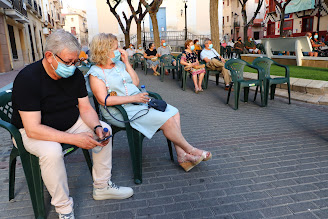Sixteen years ago today, on 7 October 2004, I parked up in Santa Pola having travelled the 1,349 miles from Huntingdon behind the wheel of a 1977 MGB GT. My travelling companion was a black and white cat called Mary. Our destination was the flat where Maggie had been living for over a month whilst she worked as a teacher in nearby Elche. The journey took two days and cost 200€ in fuel, 120€ in tolls, 55€ for accommodation and just 25€ in food.
Now, if anyone had asked, I'd have sworn that on the first full day in Spain I went and signed on the equivalent of the Council Tax Register, the padrón. In fact my diary tells me otherwise. The only interesting thing I did that first day was to go, with Maggie, to a Spanish class that she'd booked us in to. It seems I didn't get around to signing on the padrón till the week after. Even then it wasn't my first bit of officialdom - apparently I'd managed to get a social security number a few hours before. Strange how memories become distorted with time.
Having done a couple of courses of Spanish classes in the UK I spoke some Spanish when I got to Spain. My memory is that we struggled with the language but that, overall, we used to manage OK. Again my diary suggests that I may be misremembering. I obviously felt strongly enough about it at the time to record that I had problems buying dusters and kidney beans one day! I didn't know the Spanish for either and, though I found the dusters easily enough, there were two jars of potential candidates as kidney beans. My solution, at the time, was to go to the international section in the supermarket (we were in Santa Pola after all) where I went through the ingredients on the side of a can of chilli con carne to find the Spanish words I needed. I suspect that the entry is a sign of frustration at feeling lost and adrift with the language. It's a frustration I still often feel.
As well as misremembering there are other early entries in the diary that show just how wrong some first impressions were. We went to Villena that first weekend. In my diary I mention that the town seems nice enough but that it has no "old part". If you've ever been to Villena you'll know just how wrong that is. It also shows too just how lost we were. Nowadays, when we go to a new town we always head for the bit where the town hall and parish church are because that's where the heart of the town will be. Seemingly we didn't know to do that in Villena all those years ago.
The house hunting began nearly straight away. If we could we went out looking at places together. There were a lot of cowboy house sellers at the time and we saw all sorts of junk. We soon became very aware of some of the very dodgy sales techniques of the numerous get rich quick merchants in a market where house prices were rising week by week. On lots of occasions people were simply wasting our time so it became routine for me to talk to agents and sellers and have a look at the places alone so that I could filter out the no hopers. Later Maggie and I would go back to anything that I'd added to the "reasonable" pile.
Eventually I went to an Estate Agent in Monóvar who showed me, amongst others, the house in Culebrón where we now live. I saw other houses, with a different agent, in the same area, around Pinoso, on the same day. I didn't care for the Culebrón house much and I discounted it but, the next day, on the Saturday, I'd arranged for some second viewings so that Maggie could see my selection. As we passed, what is now, our track I made the short detour to show the house to Maggie. It just happened that the owner had been so appalled by the state of the garden, when he'd shown me around, that he'd come back to do a bit of tidying up. By sheer fluke he was in the garden when we showed up and so he was available to show us around. I still didn't like the house much though the driveway was nice. Maggie hated the other houses I'd lined up but she reckoned the Culebrón house had potential. The truth is that our house hunting was not going well, we didn't have enough money and we seemed to be running out of options. With the help of the estate agent we got a builder to have a look. On a miserable November evening in the light of very low wattage bulbs Maggie invented a plan for the design of our house on the spur of the moment. It was drawn freehand in an old school notebook. A few days later we got the builder's quote back and on the 19th November we made an offer on the house which the owners rejected. We ended up paying the full asking price.
Back in the diary my summing up at the end of the year contained the following - "... and now living in Spain with absolutely no income, no job prospects to talk of and living off Maggie. I've just agreed to spend all the money I have in the world on a damp, shed like house in the middle of bugger all where. I am quite unable to speak the language".
We didn't complete the purchase till after the Christmas holidays and we didn't move in till April of 2005. I have a photo of Maggie, the photo at the top of this post, unlocking the gate as we took possession and, every time I see that snap, I remember the feeling in the pit of my stomach that we had just made the most terrible mistake.
The oddest thing though is that, the other day, I was driving somewhere close by - it could have been the Yecla road or the one down to La Romaneta - and I found myself grinning all over my face for no apparent reason. I was thinking how stunning the countryside looked and congratulating myself on having made the right decision when we upped sticks and moved here.
Oh, and in't seat o'nowt, as we say where I was born or aprovechando que el Pisuerga pasa por Valladolid as we say in the place where I live, there's another entry in my diary about the first weekend after getting here in 2004 which notes that our first meal out was at a local Chinese restaurant and cost a massive 4.96€.
























